An Associate Professor of Mass Communication, Dr. Olunifesi Adekunle Suraj has expressed concern over the low literacy rate amongst Nigerians saying such if not immediately addressed would further plunge the nation into serious security crisis.
Olunifesi reveled this in an interview with NewsClick Nigeria during the 17th Annual International Security Conference, held on Saturday, November 23 at the Faculty of Social Sciences Auditorium, University of Lagos (UNILAG), Akoka, Lagos.
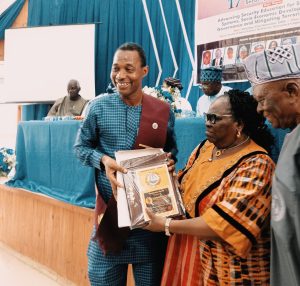
NewsClick Nigeria reports that the Conference had in attendance a former Chief of Army Staff, Lt. Gen. Tukur Buratai (rtd), UNILAG Vice Chancellor, Prof. Folasade Ogunsola, former Vice Chancellors, Professors and security experts.
According to the university don who anchored the conference, security is everyone’s business and citizens must be actively involved. He explained that the insecurity particularly in the northern part of the country festers because of the low literacy level of citizens.
“To effectively tackle insecurity, we need to go to the grassroots. Security is everybody’s job, and most of the security challenges we have in this nation can be attributed to low literacy rate. The newly sprung up terrorist sect, Lakurawa group came into a community and residents there were unable to discern that they were infiltrators with dangerous motives. We need local intelligence gathering with people acting as vigilantes in their various communities.
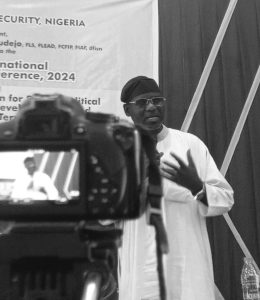
I think Nigeria also needs to democratise security literacy by letting the grassroots be aware so that if they see people who pose as security threats, the intelligence system is alerted to act before their nefarious activities are carried out. We also need mobilization, orientation, awareness programs that will reach the grassroots that are likely causalities of these terror acts,” he said
NewsClick Nigeria reports that adult literacy rate is the percentage of people from the age of 15 who can both read and write, with understanding, a short simple sentence about their everyday life.
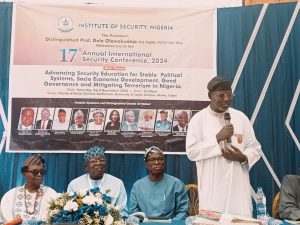
The Federal Government recently pegged literacy rate at 69 percent, meaning 31 percent of the population are still illiterates. A breakdown of data from the National Bureau of Statistics (NBS) has shown that the northern part of the country has the lowest number of literates with Yobe State having the lowest literacy level of 7.23 per cent, Zamfara 19.16 per cent, Katsina 10.36 per cent and Sokoto 15.01 per cent, while the Southern states have higher literacy level with Imo State topping with 96.43 per cent, Lagos 96.3 per cent, Ekiti 95.79 per cent, and Rivers 95.76 per cent.
Olufenisi also advocated for quality security education in the nation’s tertiary institutions to better arm the student populace.
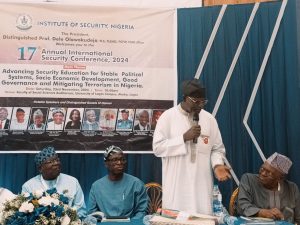
‘Security education in our tertiary institutes is relatively low. Most of the programs we have are not tailored specifically to meet security needs. We need more of security education so that the student populace can be well oriented and proactive. The student populace needs to open their eyes, social media is becoming a threat and that is where some of these security issues play out. Nigeria students need to be more aware, they need to have more literacy, they need to be more engaging, we need to setup security in the university system that will have seamless interaction with the Defence Ministry especially as relates to security education and literacy.’
Tasking the media on its roles in combating insecurity, Olunifesi said: ‘The media as an agenda setter needs to be more vocal on security issues. They should discuss it, open panels, conduct regular reviews and opinions around security issues. The more the narrative is pushed out there, the better people are informed and we can take an informed decision.’
The don explains that personally, he has initiated fruitful collaborations with the military on bettering security literacy across board. He also runs a non-government organization (NGO) where security courses and issues are professional treated.
‘I consult for the military and have had a robust conversation about why system do not necessarily have to wait but respond to it. My NGO, Africa Centre for Media Dialogue runs certificate courses on security related programmes. We’re also partnering with the military to do more on these areas so that the gown and the military can meet together to have more literacy and programmes to infuse security into our curriculum,’ he said.
For the government, Olunifesi said: ‘Governments across board should be more conscious about security issues. They need to keep the border and orientate the masses about the need to secure their country. They also need to do a lot of intelligence gathering/information, reorganize and the various security outfits so they can effectively tackle the challenges head-on. Government through the various Ministries, Departments and Agencies (MDAs) should also do more awareness and orientate people about believing and taking the country as their own.’
Meanwhile, in his keynote address, Provost, ICPC’s Anti-Corruption Academy of Nigeria (ACAN), Prof Tunde Babawale advocated the importance of security education in Nigeria and why it must take prominence spot in national discourse.
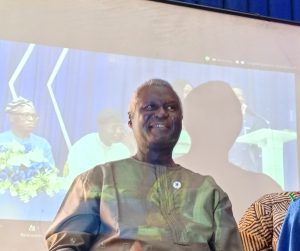
‘Thus, security education serves as a critical mechanism for cultivating a stable political environment, fostering economic growth, and mitigating the risks of ethno-religious violence. Ultimately, the advancement of security education is not merely a proactive measure; it is an essential pillar for the sustainable development and resilience of the Nigerian society in the face of evolving threats.
In a nation like Nigeria, where the political system frequently changes with new administrations introducing various policies and strategies, continuity is critical. Governments that fail to build on the positive policies or programs of their predecessors often fall prey to nepotism, favouritism, impunity, and greed. This can lead to a disconnect between leaders and the masses, resulting in violence and criminal activities that may cause significant loss of innocent lives and property. Such outcomes highlight the detrimental impact of neglecting the importance of security education within the framework of governance. Educating citizens about security, democracy, and human rights is vital. It helps them understand governmental responsibilities and empowers them to hold leaders accountable. Furthermore, instilling the importance of participating in elections and voting for credible candidates—rather than reliance on religion, ethnicity, or sentiment—can foster socio-economic stability and create a conducive political atmosphere’.
Highlight of the conference was the conferment of Fellow of the Institute on eminent personalities including Dr Olunifesi Suraj.



